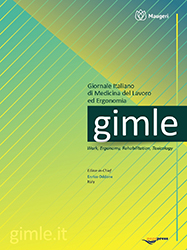ACTUALITY AND ORIGINALITY IN THE SCIENTIFIC THOUGHT OF ANGELO IANNACCONE (1925-1982)
All claims expressed in this article are solely those of the authors and do not necessarily represent those of their affiliated organizations, or those of the publisher, the editors and the reviewers. Any product that may be evaluated in this article or claim that may be made by its manufacturer is not guaranteed or endorsed by the publisher.
Authors
Background. Angelo lannaccone is certainly one of the most important personalities in the field of occupational medicine of the last century.
Aims. The fiftieth anniversary of the Post-graduate School of Occupational Medicine of the Catholic University of Rome gives us the opportunity to define this extraordinary figure of man and scientist, at over 35 years from his death.
Results. Prof. lannaccone was among the very first, if not the fürst to deal with chronobiology and occupational ergonomics in Italy, adopting the modern perspective of "upstream" prevention, since the design phase, which had to be based on the adaptation of work to man and not vice versa. He carried out important and pioneering studies on the effects of benzene on the hematopoietic apparatus and of various industrial toxicants on the neuroendocrine system. In establishing the formative principles for the occupational physician, he devoted a significant space to industrial hygiene, in the interdisciplinary perspective of prevention sciences. He gave a significant contribution to the scientific society of occupational medicine, first as a member of the board, then as the president of the Italian Society of Occupational Medicine and Industrial Hygiene. He realized the Institute of Occupational Medicine of the Catholic University of Rome and founded the post-graduate school.
Conclusions. Prof. lannaccone's contribution to occupational health and industrial hygiene emphasized applied research and prevention in the workplace.
How to Cite

This work is licensed under a Creative Commons Attribution-NonCommercial 4.0 International License.
PAGEPress has chosen to apply the Creative Commons Attribution NonCommercial 4.0 International License (CC BY-NC 4.0) to all manuscripts to be published.






